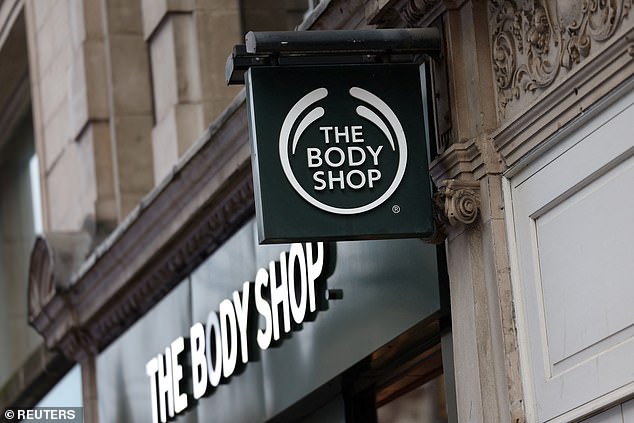It is always troubling when a once mighty brand such as The Body Shop is about to go out of business.
It is doubly sad because of the potential loss of jobs – in this case 2,000 in the 200 shops in the UK – and the impact this has on people’s livelihoods and the communities around them.
There’s also the nostalgia associated with The Body Shop, a name that most of us have grown up with and loved.
They were the first-ever shops where we could experiment with everything from exotic coconut body butters to bizarre Hemp potions.
Even if you were buying a kiwi-flavoured lip salve, you were implicitly saving the world too. What a bonus.

On the brink: The Body Shop is set to go out of business with a loss of 2,000 in its 200 UK shops
Unfortunately, nostalgia doesn’t translate into sales or profits. To be honest, the news of The Body Shop’s collapse came as no surprise. In fact, it was more surprising to know that it was still alive.
Over the last few years, it has been overtaken on the High Street by more exciting rivals like Rituals and The Ordinary company, or more upmarket by Jo Malone.
The truth is that The Body Shop has been struggling for years. The final nail came after poor Christmas trading and an even worse January. Put simply, it was running out of money to pay the bills.
So what went so wrong?
What distinguished The Body Shop from when Dame Anita Roddick opened the first store in Brighton in 1976 was that she had a story to tell. And it was a compelling story.
As a fervent environmental campaigner and human rights activist, Roddick, together with her husband Gordon, believed that business was a powerful force to do good and set high moral standards.
And that’s what she did, making The Body Shop the first company to ban ingredients which had been tested on animals and pioneering ‘fair trading’ with the developing world.
Her strident stance, leading the way for ethical consumerism, worked and customers flocked to her stores. Unusually for a retail brand, its magic travelled overseas. By 2004, Roddick had nearly 2,000 shops around the world.
Then came the body blow. Two years later, Roddick sold out to L’Oreal for £652 m, hoping that her strict values would influence the French cosmetics giant into adopting them too.
According to friends, she saw herself as a Trojan Horse-type figure, but many followers never forgave her for compromising her principles.
Looking back, The Body Shop never truly recovered from the sale, or indeed Roddick’s death.
With her no longer running the show, the business lost its voice and maybe its purpose. Just a year later, its founder died tragically young at 64.
Since then the business has passed through many hands. None of the owners have found a new or original voice.
It was only a few weeks ago that the private equity firm Aurelius hoped it could find one, paying Brazil’s beauty giant Natura £207 m for the chance.
Sadly, the disruptor who had shown there was another way of selling cosmetics to women, rather than buying expensive pots from po-faced beauty assistants in swanky department stores, may have caused her own demise.
By opening up the market, she paved the way for rivals but left The Body Shop behind playing catch-up.
What next? Rescuing the business is going to be tricky. As well as the UK, there are another 12,000 staff working in franchises in 3,000 stores in 70 countries around the world.
Whoever dares try to pluck the best bits from the administrators will be looking to slash costs, sell property, reduce rents and build up its online presence.
Next’s Lord Wolfson – who is becoming something of a magpie with his predilection for snapping up even jaded brands for his online platform – is said to be interested in parts of the business.
Let’s hope so. Yet even a brilliant retailer like Wolfson will need more than hippyish potions to bring The Body Shop back to life.
Cuts delayed?
Higher than expected inflation in the US may have delayed the next round of interest rate cuts until the summer.
At 3.1 per cent, January’s inflation was up on forecasts, suggesting the Federal Reserve will wait a bit longer before cutting.
Analysts have been looking for six cuts this year but that’s been trimmed back to four.
Inflation figures out today for the UK are also likely to be up a little. Hopes of an early rate cut here are hanging by a thread.
Some links in this article may be affiliate links. If you click on them we may earn a small commission. That helps us fund This Is Money, and keep it free to use. We do not write articles to promote products. We do not allow any commercial relationship to affect our editorial independence.



